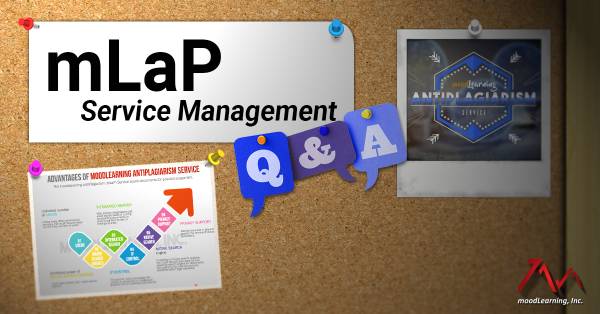Table of Contents
mLaP Service Management Q&A
Copyright
- Who owns the copyright of uploaded materials?
Institutional partners retain the copyright of uploaded materials. Uploaded digital materials (e-books, journal articles, white papers, databases) are used purely for reference purposes in running plagiarism checks with the mLaP Service. They are indexed and “finger-printed” by moodLearning Search only on request by an institutional partner. Institutional partners are advised to seek guidance from their respective legal departments on the use of copies of copyrighted materials, even if only for instructional purposes.
Privacy
- Do uploaded papers maintain the privacy of the owners of individual papers?
Papers or materials uploaded by individuals within an mLaP institutional installation would figure in the results screen if portions (or the entirety) of such materials are found to be statistically similar to the other submissions. Only those with teacher role can view the actual results of mLaP scans in a course.
Institutional partners that upload papers or materials en masse are advised to de-identify such papers or to remove personal identifiers found in such documents. What can or cannot be uploaded en masse is a decision left entirely to partner institutions. moodLearning machines (with minimal to zero human intervention) are simply processing information on behalf of these institutions.
Opt-Out
- What are the opt-out options for individuals and institutions?
A partner institution can opt out of the mLaP Service by requesting that its documents uploaded en masse be deleted from the reference documents.
Upon completion of their courses, individuals who have uploaded articles or assignments to learning management system (LMS) on which the mLaP Service runs, may request to have their accounts deleted from the system, subject to the concurrence of the institutional partner.
An upload administrator duly designated by the partner institution may also have control over which files are to scanned by moodLearning Search and the mLaP Service. He can delete all the files and effectively opt out of the plagiarism scanning service.
Uploads
- What should be uploaded en masse?
Materials that are likely to be plagiarized. moodLearning suggests that the cache of materials to be uploaded should be broad enough to also include those from related subjects and from disciplinal specialties. Where appropriate or warranted, submissions from students from previous school terms and from similar courses may be good references for plagiarism checks.
- Can the institution delete the uploaded materials?
A partner institution may designate an admistrator who can dynamically control what uploads are made available for scanning by the mLaP Service.
Reliability and Validity
* Are the results of mLaP plagiarism checks valid and reliable?
The results are given out as percentages of similarities. Insofar as the figures on similarities between documents are concerned, they are very reliable, specially in relation to peer submissions and comparisons. However, it's the evaluator of the submitted work who will finally validate for himself whether plagiarism has occured, given the evidence of similarities (all highlighted in red) between the submitted work and the references cited.
Just like with many antiplagiarism apps, the mLaP Service could yield false positive or false negative results. These are, however, minimized over time as teachers from institutional partners provide more feedback to the service.
